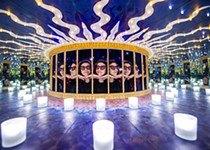
The Silver Unit setup, situated in the mall's parking lot through the evening of Feb. 3 before embarking on an 11-month tour, revolves around a 35,000-gallon water tank/fountain beneath a circular stage hosting "European-style" performances: "There's kind of a higher level of artistry involved," says Chicago-bred aerialist Samantha Kulinski, pictured here during her hoop act. "It doesn't mean that traditional American circus artists aren't talented ... but often, there's more storyline. Like our show right now [is] a voyage through Italy, so all the acts are connected, versus variety act [after] variety act."

Not every performance uses water, yet each strives to dazzle people of all ages with a fusion of Italian history and amazing human feats: "The perception of circus in America is lions, tigers, and bears, and the clown with the big, poofy hair, but there's so much more depth to circus than that," says Silver Unit manager Morgaine Rosenthal, who – among many other roles – portrays Juliet in an aerial interpretation of the original, Italian folktale version of Romeo and Juliet (pictured). "There is historical significance, there's beauty, there's an element of magic to it."

45-year-old Gimmi Fornaciari (pictured) – one of six Italians in the multinational group and who was born into a circus family dating back three generations – provides more subtext: "In Italy, [the water circus] is very famous," he says, adding that the country is home to more than 160 active circuses. Historically, water was the conduit by which Italian culture was preserved and transferred: "Italia was the big commercial port with Greece ... and everybody."

In Cirque Italia, conveying such ideas is often as simple as pointing out the popularity of Ferrari in Milan ("It's Gucci everything," says Fornaciari), with a performer clad in the luxury car company's swag while pulling off death-defying feats in a rapidly rotating, suspended wheel.

Whether it's delivered via onstage acrobatics or the comic-relief mime-clown who appears between acts (pictured), the end goal is consistent: "For us, as performers, seeing the reaction from the little kids is really the most rewarding part of [the] job," says Rosenthal. "It's like you come into the tent and you're going into a whole different universe."













